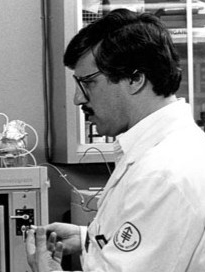| Abstract: |
G-CSF belongs to a family of hematopoietic growth factors, also known as colony stimulating factors. It supports the growth and differentiation of predominantly committed neutrophil precursors and activates the function of peripheral blood neutrophils in vitro. In vivo studies in primates (Cynomolgus monkeys) demonstrated that G-CSF is a potent myeloid growth and differentiation factor causing a dose-dependent increase predominantly in the peripheral blood neutrophils. To assess the effects of G-CSF in chemotherapy induced cytopenias, we administered G-CSF to monkeys that had been treated with cyclophosphamide (60 mg/kg/dx2), or repeated cycles of busulfan (4, 6 or 10 mg/kg/dx3). In both, cyclophosphamide and busulfan induced myelosuppression, G-CSF in doses between 10 and 30 μg/kg/d was able to significantly shorten the time of neutropenia. In addition, monkeys were treated with G-CSF (50 or 100 μg/kg/d) for one month post autologous bone marrow transplantation following total body irradiation. The time of neutropenia (less than 1000 neutrophils/mm3) was shorter in the G-CSF treated monkeys (10 days in the 100 μg/kg/d treated monkey) compared to two controls (21 days). The post transplant absolute neutrophil count of approximately 30 000/mm3 could be maintained for the entire period of G-CSF exposure. A study of G-CSF has been initiated in patients with transitional cell carcinoma of the urothelium who were to receive combination chemotherapy. G-CSF was administered to 22 patients daily for 6 days prior to chemotherapy and at day 4-11 post chemotherapy at a dose of 1-60 μg/kg/d. In all patients, a dose dependent increase in the absolute neutrophil count was observed prior to and following chemotherapy. G-CSF was also tested for its effects on the blast cells of acute myeloid leukemia (AML). It supported the colony formation and the growth of AML cells in suspension culture and was able to induce differentiation in some leukemias. Although there is evidence that G-CSF might be involved in the growth regulation and differentiation of myeloid leukemia, there was a marked heterogeneity in response to G-CSF in all these assay systems. |



